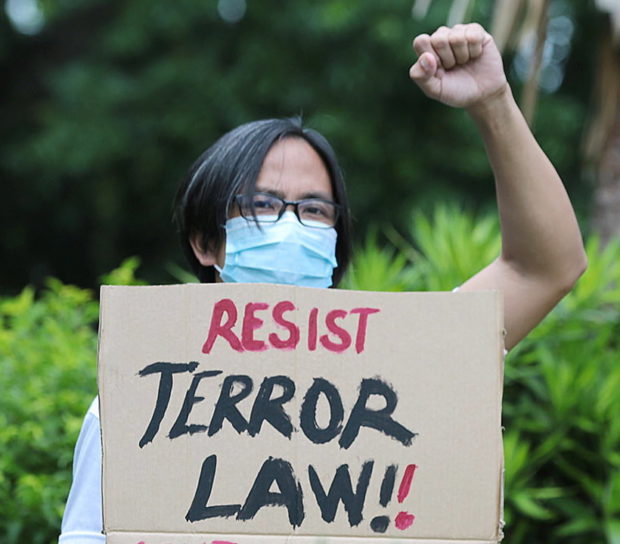Striking out parts of terror law a ‘small victory’ for human rights, advocates say

FILE Protesters gather at the Resist Terror Law rally on Tuesday, July 7, 2020, which coincides on the 128th year anniversary of the Katipunan, at the University of the Philippines in Diliman, Quezon City. The group Movement Against the Anti-Terrorism Act (MATA) express outrage over President Duterte’s failure to preserve and defend the constitution. INQUIRER PHOTO / GRIG C. MONTEGRANDE
MANILA, Philippines — The Supreme Court’s decision to strike down parts of the Anti-Terrorism Act (ATA) is a ‘small victory’ for human rights, critics of the law and rights advocates said on Thursday.
Separate statements of the National Union of People’s Lawyers (NUPL), lawyer and professor Tony La Viña, Bayan Muna Rep. Carlos Zarate, Free Legal Assistance Group (FLAG) chair Chel Diokno, and other legal luminaries indicated that the removal of the qualifier in Section 4 of Republic Act No. 11479 as an important win in protecting the rights of the people.
“[FLAG] considers the decision of the Supreme Court to strike down the qualifier to the proviso in Section 4 of RA 11479 as unconstitutional for being overbroad and for being an infringement of Freedom of Expressions as an important win for the protection of civil liberties,” Diokno said in a statement.
“The striking down of these unconstitutional provisions is a victory for human rights and civil liberties. This guarantees the protection to the people’s continued exercise of free speech, expression, assembly, including academic freedom, especially in voicing dissent against government shortcomings and excesses,” professors from the Far Eastern University Institute of Law, led by Dean Mel Sta. Maria.
Section 4 of the ATA is the portion of the law that defines what action constitutes terrorism.
Article continues after this advertisementUnder Section 4 (e), the law clarifies that terroristic acts do not include “advocacy, protest, dissent, stoppage of work, industrial or mass action, and other similar exercises of civil and political rights”.
Article continues after this advertisementThis phrase was followed by a qualifier which says “which are not intended to cause death or serious physical harm to a person, to endanger a person’s life, or to create a serious risk to public safety” — the particular portion deemed unconstitutional by high court for being overbroad and violative of freedom of expression.
However, Zarate, La Viña, and NUPL president Edre Olalia claimed that the victory is overshadowed by the possible upholding of other provisions in the ATA that they are wary of.
“We regret that all the rest of the perilous provisions like other forms of designation, warrantless arrest, prolonged detention, freezing of assets, proscription, definitions of incitement, recruitment, membership, material support, humanitarian assistance etc) remain in the books, for now,” Olalia said in a statement.
“It removes the chilling effect of the ATL on free speech, expression, assembly, and association. But it is a small victory in what is still a big defeat for human rights,” La Viña added.
Zarate warned that retaining other allegedly dangerous provisions may still give the administration the power to attack critics and the opposition, especially during the election period looming.
“The decision’s affirmation of the many anti-people provisions of the terror law may still give the president, especially now President Duterte, a booster shot for further attacking his critics and the opposition. The decision may also open wide the floodgates for more killings and attacks against critics of the regime and the opposition, especially during this election period,” Zarate said.
All three also agree that there would be a need to regroup forces and craft the best plan to contest the decision through the filing of motions for reconsideration.
“We will certainly regroup and close ranks and file a motion for reconsideration. We will not allow the dying of the flickering light of our basic rights,” Olalia said.
“The fight – including motions for reconsideration — must now focus on the provisions that affect due process rights and other rights of the accused: arrest and detention, designation by the Anti Terror Council, freezing of funds, etc,” La Viña said.
“While a motion for reconsideration remains an option, the key in thwarting the draconian plans of those in power is a vigilant and united people. An attack on one is an attack to all. We are calling on every freedom-loving Filipino to be on guard and always be alert as we continue to oppose, expose and battle any abuse of this administration,” Zarate added.
Earlier, the SC’s Public Information Office released the advisory informing the public of the parts deemed unconstitutional, which also includes Section 25 of the ATA.
This means the government now cannot automatically designate groups as terrorists on the mere basis that they are included in the European Union (EU) or United Nations (UN) lists.
The controversial Anti-Terrorism Act was passed by Congress on June 3, 2020, and was signed into law by President Rodrigo Duterte on July 3.
While it was hailed by administration allies and proponents of the law as a deterrent against terrorism — with Defense Secretary Delfin Lorenzana himself saying that fear of the law is baseless — several groups claimed that it may be used against critics of the government.
READ: Robredo questions ‘forced’ passage of Anti-Terrorism Bill amid pandemic
Just after it was enacted, the law encountered several criticism as it took effect: a total of 37 petitions were filed before SC to contest particular sections of the ATA which may pose threats to human rights and may be prone to abuse.